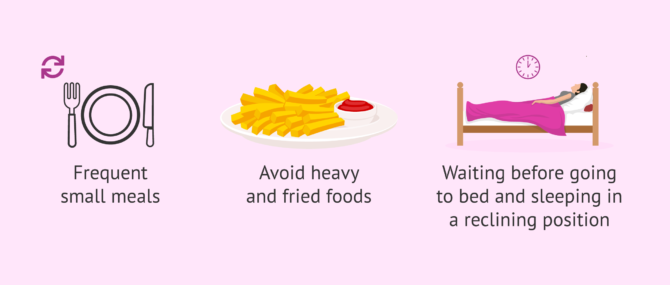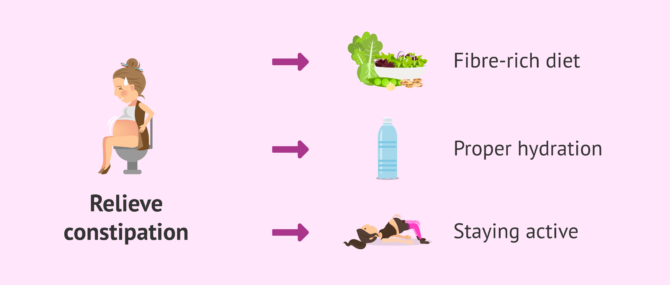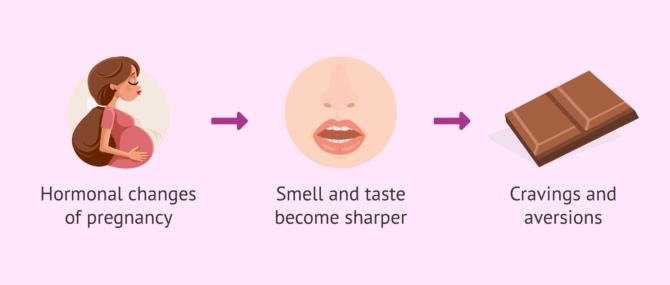Pregnancy is a process during which a woman's body adapts to major changes over the course of nine months. Therefore, during pregnancy it is normal to feel discomfort associated with these internal changes and, depending on the stage of pregnancy a woman is in, she will notice some symptoms or others.
This is the case of digestive discomfort, which is favored by hormonal changes (specifically, by the increase in progesterone) and by the growing size of the uterus.
In any case, if the pregnant woman presents any of these discomforts and they are not reduced with the general advice and recommendations, she should always consult a specialist before self-medicating. Many drugs should not be used during pregnancy and taking them could endanger the baby's health.
Provided below is an index with the 8 points we are going to expand on in this article.
- 1.
- 1.1.
- 2.
- 3.
- 4.
- 5.
- 5.1.
- 5.2.
- 5.3.
- 6.
- 7.
- 8.
Heartburn and acidity
During pregnancy a woman may experience heartburn and acidity, also known as heartburn heartburn. This symptom occurs when there is a rise or reflux of stomach contents (with stomach acid) into the esophagus, which causes burning in the chest and throat area.
The increase in progesterone in pregnancy causes the esophagus-stomach junction (the lower esophageal sphincter) to relax. In addition, the enlargement of the uterus will cause the stomach to be displaced and change its position. All this will favor reflux and, therefore, acidity.
Thus, it is more common to feel this discomfort from the second and especially in the third trimester of pregnancy (when the uterine size begins to be considerable), and it usually lasts until the baby is born.
Tips for reducing heartburn
To alleviate the heartburn that pregnant women may experience, these recommendations can be very useful:
- Eat small meals frequently to avoid filling the stomach, eating slowly and chewing food well. Similarly, to avoid overfilling the stomach, it is best to drink water outside of meals.
- Avoid heavy meals and certain foods such as fried foods, spicy foods, coffee, tea, chocolate, citrus fruits, tomatoes, soft drinks, etc.
- Wait a while before lying down, bending over or exercising after eating.
- Do not sleep completely flat. Cushions can be used to recline a little or to slightly raise the head of the bed.
In addition, it is recommended that the pregnant woman wear comfortable, loose-fitting clothing to avoid compressing the abdominal area.
Nausea and vomiting
Nausea is such a well-known and typical symptom of the first trimester of pregnancy that, if it is not present, a woman may wonder if something is wrong. However, it is important to know that not all pregnant women have them and that does not mean that something is wrong.
This symptom can occur at any time of the day, but nausea and vomiting are more frequent in the morning. For this reason, they are also called morning sickness and vomiting.
Its cause is not entirely clear, but it has been related to the hormonal changes experienced by women during pregnancy.
When nausea and vomiting are constant and intense, they can cause dehydration and weight loss in the pregnant woman, as well as certain obstetric complications. This situation is a more serious expression of common nausea and vomiting, should be consulted with the specialist and treated in time and is called hyperemesis gravidarum.
Constipation
Constipation is a fairly common symptom in pregnant women. High levels of progesterone during pregnancy make digestion slower and feel heavier, which can also cause gas.
However, despite this, the enlargement of the uterus should also be mentioned as a cause related to constipation in pregnant women. It puts more and more pressure on the intestines, making intestinal transit more difficult.
In addition, constipation and other factors related to pregnancy (such as venous return is more difficult and progesterone relaxes the walls of blood vessels) can lead to the appearance of annoying hemorrhoids.
To avoid constipation and thus prevent hemorrhoids, it is essential to eat a diet rich in fiber containing vegetables, fruits, legumes and whole grains.
On the other hand, pregnant women should not forget to maintain proper hydration. Exercise adapted to pregnancy and staying active (if not contraindicated by the specialist) will help the pregnant woman to improve intestinal transit.
Changes in taste and smell
Pregnant women may reject, even because of their odor, foods that they used to eat regularly before pregnancy and that now make them feel nauseous. Not to mention the well-known cravings for a particular food or dish, which begins to crave in an unusual and exaggerated way.
These changes in tastes and food preferences are frequent in pregnancy due to hormonal changes and the sharpening of smell and taste. However, it should be taken into consideration that these cravings and aversions do not affect the diet to remain healthy, varied and balanced so that neither the mother nor the baby is lacking in any nutrient.
FAQs from users
Is it normal to be very hungry during pregnancy?
Yes, the baby's development requires that the mother eats a healthy and balanced diet, so that there are no nutrient deficiencies. In addition, it is advisable to eat small frequent meals, so that the supply of nutrients to the baby is continuous, and thus avoid long periods of fasting.
Is it bad to have cravings in pregnancy?
Cravings are an exaggerated appetite for a food or food that the pregnant woman feels the need to eat immediately.
In general, it is not a bad thing to have cravings and they can be satisfied, as long as this does not mean that the pregnant woman's diet is no longer varied and balanced, as this would lead to nutritional deficiencies.
Does reflux and heartburn in pregnancy affect the baby?
Reflux and heartburn are very common complaints in pregnancy, due to the hormonal changes typical of this stage and the displacement of the stomach as the uterus grows in size. This causes the acidic contents of the stomach to back up into the oesophagus, which leads to a burning sensation or heartburn in the chest, behind the breastbone and in the throat.
However, these common discomforts of pregnancy do not necessarily affect the baby.
Suggested for you
Hot flashes are another common discomfort in pregnancy. If you want to know how to relieve them, we recommend you visit the following link: What are hot flashes in pregnancy and how to relieve them?
We make a great effort to provide you with the highest quality information.
🙏 Please share this article if you liked it. 💜💜 You help us continue!
References
Ali RAR, Hassan J, Egan LJ. Review of recent evidence on the management of heartburn in pregnant and breastfeeding women. BMC Gastroenterol. 2022 May 4;22(1):219. doi: 10.1186/s12876-022-02287-w. PMID: 35508989; PMCID: PMC9066781. (View)
Body C, Christie JA. Gastrointestinal Diseases in Pregnancy: Nausea, Vomiting, Hyperemesis Gravidarum, Gastroesophageal Reflux Disease, Constipation, and Diarrhea. Gastroenterol Clin North Am. 2016 Jun;45(2):267-83. doi: 10.1016/j.gtc.2016.02.005. PMID: 27261898. (View)
Chortatos A, Haugen M, Iversen PO, Vikanes Å, Magnus P, Veierød MB. Nausea and vomiting in pregnancy: associations with maternal gestational diet and lifestyle factors in the Norwegian Mother and Child Cohort Study. BJOG. 2013 Dec;120(13):1642-53. doi: 10.1111/1471-0528.12406. Epub 2013 Aug 7. PMID: 23962347. (View)
Crozier SR, Inskip HM, Godfrey KM, Cooper C, Robinson SM; SWS Study Group. Nausea and vomiting in early pregnancy: Effects on food intake and diet quality. Matern Child Nutr. 2017 Oct;13(4):e12389. doi: 10.1111/mcn.12389. Epub 2016 Nov 29. PMID: 27896913; PMCID: PMC5400073. (View)
Reijonen JK, Tihtonen KMH, Luukkaala TH, Uotila JT. Association of dietary fiber, liquid intake and lifestyle characteristics with gastrointestinal symptoms and pregnancy outcome. Eur J Obstet Gynecol Reprod Biol X. 2022 Oct 15;16:100168. doi: 10.1016/j.eurox.2022.100168. PMID: 36312325; PMCID: PMC9614560. (View)
Reijonen JK, Tihtonen KMH, Uotila JT, Vihtamäki T, Luukkaala TH. Dietary fibre intake and lifestyle characteristics in relation to nausea or vomiting during pregnancy-a questionnaire-based cohort study. J Obstet Gynaecol. 2022 Jan;42(1):35-42. doi: 10.1080/01443615.2021.1871886. Epub 2021 May 4. PMID: 33942705. (View)
Vazquez JC. Heartburn in pregnancy. BMJ Clin Evid. 2015 Sep 8;2015:1411. PMID: 26348641; PMCID: PMC4562453. (View)
FAQs from users: 'Is it normal to be very hungry during pregnancy?', 'Is it bad to have cravings in pregnancy?' and 'Does reflux and heartburn in pregnancy affect the baby?'.





